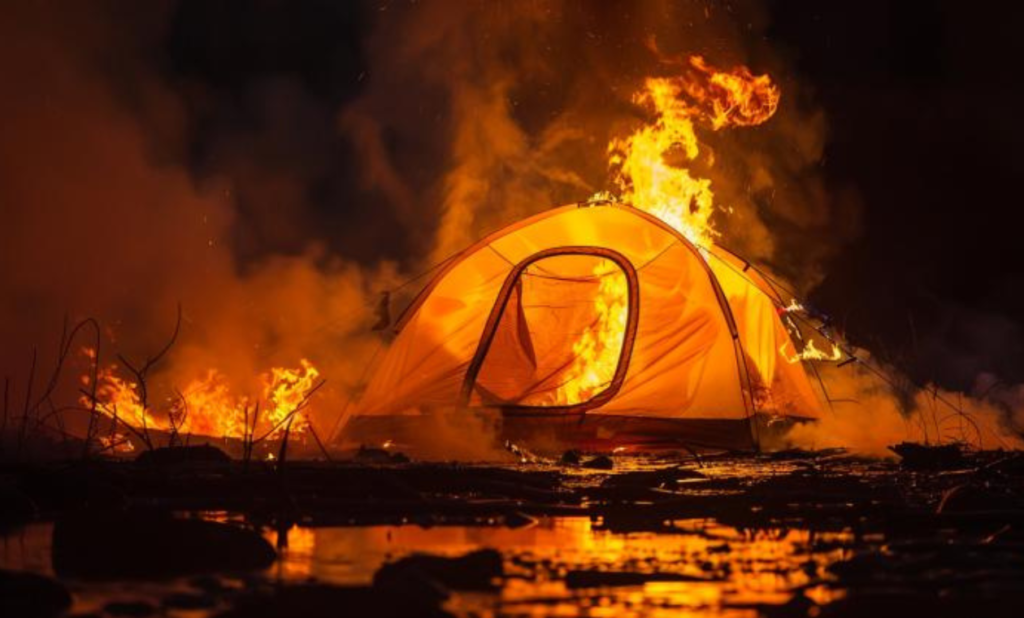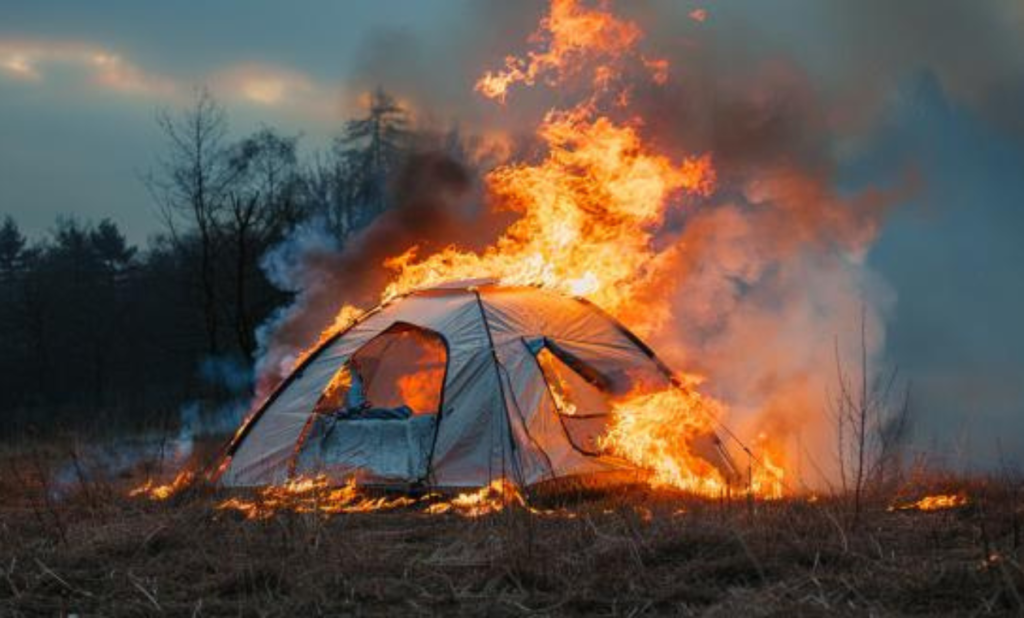Imagine this: you’re sitting around a crackling campfire with your loved ones, gazing up at the starlit sky, and savoring the taste of toasted marshmallows. The flickering flames create a warm and inviting atmosphere, filling the air with a sense of comfort and serenity. It’s moments like these that make camping so special, allowing us to escape the hustle and bustle of everyday life and reconnect with nature.
But amidst the tranquility and beauty of the great outdoors, it’s important to remember that safety should always be our top priority. And when it comes to camping with an inflatable tent, fire safety is paramount.
In this article, we will delve into the essential fire safety guidelines for camping with an inflatable tent. We’ll explore tips on preventing fires, necessary safety measures to take, and the importance of emergency procedures. By following these rules, you can ensure a responsible and enjoyable camping experience, free from the worry of potential fire hazards.
So, let’s dive in and discover how you can protect yourself, your loved ones, and the pristine wilderness while embracing the joy of camping.
Key Takeaways:
- Follow fire safety guidelines when camping with an inflatable tent to ensure a responsible and enjoyable experience.
- Prevent fires by avoiding open flames, candles, or portable heaters inside the tent.
- Ensure proper ventilation in the tent to reduce the risk of carbon monoxide buildup.
- Have an emergency plan in place and keep fire extinguishers and a well-stocked first aid kit readily available.
- Consider choosing a fireproof tent to enhance your safety while camping.
What is a Fireproof Tent?
A fireproof tent, also known as a fire-resistant tent, is a specialized camping shelter designed to withstand exposure to flames and high temperatures. These tents are constructed using fire-resistant materials and are often treated with fire retardants to enhance their resistance. The primary purpose of a fireproof tent is to provide a safe refuge in case of a camping-related fire incident, giving campers a precious time to escape the danger.
Fireproof tents are made of fire-resistant materials that have been specially engineered to withstand the heat generated by flames. These materials are often treated with fire retardant chemicals, which slow down the spread of fire and prevent the tent from catching fire. The use of fire-resistant materials and fire retardants significantly increases the tent’s ability to withstand exposure to flames and high temperatures.
Fireproof tents are essential for campers who prioritize safety and want to minimize the risk of fire-related incidents during their camping trips. These tents provide a secure shelter in case of emergencies and allow campers to have peace of mind knowing that they have a reliable refuge. Whether it’s a stray campfire ember or a cooking mishap, a fireproof tent can provide valuable time for campers to escape safely.
Fire Dangers While Camping and Who Needs Fireproof Tents
When enjoying a camping trip, it is important to be aware of the potential fire dangers that can arise. Whether it’s the threat of wildfires, uncontrolled campfires, cooking accidents, or even human error, these risks should not be taken lightly. This is especially true for those camping in areas prone to wildfires or where campfires are a common activity.
To mitigate these fire dangers and ensure the safety of campers, it is crucial to consider using fireproof tents. Fireproof tents are designed to withstand exposure to flames and high temperatures, providing a secure refuge in case of a fire-related incident. By investing in a fireproof tent, campers can significantly reduce the risk of harm and damage caused by fires.
- Wildfires: Campers in areas prone to wildfires should be particularly cautious. Wildfires can spread rapidly, posing a significant threat to campers and their surroundings. It is essential to stay informed about fire conditions in the area and follow any evacuation orders or safety guidelines provided by local authorities.
- Campfires: While campfires can be enjoyable, they can also be dangerous if not handled properly. Uncontrolled campfires can quickly escalate and cause widespread damage. Always ensure campfires are properly extinguished, never leave them unattended, and follow any fire regulations or restrictions in place.
- Cooking: Cooking accidents are another common cause of fires while camping. Whether using a portable stove or an open fire, it is crucial to exercise caution and keep flammable materials away from the cooking area. Never leave cooking appliances unattended and always use designated cooking areas whenever possible.
- Human Error: Even the most experienced campers can make mistakes that can lead to fire incidents. It is essential to educate oneself about fire safety and always practice responsible camping habits. This includes properly extinguishing any flames, using fireproof equipment and materials, and following all safety guidelines.
By taking these fire dangers into consideration and utilizing fireproof tents, campers can significantly reduce the risk of fire-related accidents and ensure a safer camping experience. Fireproof tents provide an extra layer of protection and peace of mind, allowing campers to enjoy their outdoor adventures without constantly worrying about fire hazards.
Understanding Fire Retardants and Flammability Standards
Fire retardants play a crucial role in enhancing the fire resistance of camping tents. By applying these substances or treatments to the tent’s fabrics and materials, their flammability is significantly reduced. This means that fire retardants make the tent less susceptible to catching fire, providing campers with an added layer of safety.
A widely recognized certification standard for assessing the fire resistance of camping tents is the Flammability Standard CPAI-84. This standard is applicable in the United States and involves rigorous testing to ensure that tents can withstand exposure to open flames without igniting or spreading flames. Tents that meet the CPAI-84 standard are designed to provide a higher level of protection against fire-related incidents.
Fire-resistant fabrics are commonly used in the construction of camping tents. These fabrics are specifically engineered to have a higher resistance to flames and heat, reducing the tent’s vulnerability to fire hazards. Fire-resistant treatments are also applied to enhance the fabric’s ability to withstand fire, making it an essential component in fireproofing tents.
It’s important for campers to understand the significance of fire retardants and the relevance of the Flammability Standard CPAI-84 when choosing a camping tent. By selecting a tent that incorporates fire-resistant fabrics and meets the required flammability standards, campers can significantly reduce the risk of fire-related incidents during their camping adventures.
Explore the advantages of fire-resistant tents and the importance of fire-resistant treatments in our next section.
How to Check if Your Tent is Fireproof

Ensuring that your tent is fireproof is essential for your safety while camping. Here are some methods to determine if your tent has been treated with fire retardant:
- Check the labels or tags on the tent: Look for indications of the use of fire-resistant chemicals. These labels or tags will typically specify that the tent is fireproof or has undergone fire retardant treatment.
- Refer to the manufacturer’s instructions or documentation: Often, the manufacturer provides information about fire-resistant treatments in the accompanying instructions or documentation. These instructions will give you a better understanding of the fireproof capabilities of your tent.
- Contact the manufacturer or retailer: If you are still unsure about the fire retardant treatment of your tent, reach out to the manufacturer or retailer for clarification. They will be able to provide more details about the fireproof properties of the tent and answer any questions you may have.
When considering the fireproof capabilities of your tent, it’s also important to take into account the potential health and environmental effects of fire retardants. While fire retardants enhance the fire resistance of the tent, they may have certain implications. It’s advisable to research and choose fireproof tents that prioritize both safety and environmental sustainability.
To give you a better idea of what fire retardant treatment labels and tags may look like, here is an example:
“This tent has undergone fire retardant treatment to enhance fire resistance. Please refer to the manufacturer’s instructions for more information.”
By checking the labels or tags, referring to the manufacturer’s instructions, and considering the health and environmental effects, you can ensure that your tent is fireproof and enjoy a safer camping experience.
Fire Safety Precautions While Camping with an Inflatable Tent
When embarking on a camping adventure with an inflatable tent, it is crucial to prioritize fire safety to ensure a secure and enjoyable experience. By taking appropriate precautions, campers can minimize the risk of fire incidents and promote responsible camping practices. Here are some essential fire safety guidelines to follow:
- Avoid open flames inside the tent: Open flames, such as candles or portable heaters, should never be used inside the tent. These can easily ignite flammable materials and pose a significant fire hazard.
- Ensure proper ventilation: Proper ventilation is key to reducing the risk of carbon monoxide buildup inside the tent. Make sure the tent has sufficient airflow to dissipate any potential buildup of hazardous gases.
- Create an emergency plan: Develop an emergency plan in case of a fire. Identify the nearest emergency exits and establish a meeting point outside the campsite where everyone can regroup safely.
- Keep fire extinguishers handy: Make sure to have fire extinguishers readily available at the campsite. Familiarize yourself with their operation and ensure they are in good working condition before your camping trip.
- Stock a well-equipped first aid kit: Having a comprehensive first aid kit is essential for any camping trip. Include items specifically for burn injuries, such as burn ointment, sterile dressings, and pain-relieving medications.
Remember, smoking inside the tent is strongly discouraged, as it increases the risk of accidental fires. Follow these fire safety measures to protect yourself, your fellow campers, and the natural environment you are exploring.
By adhering to these fire safety precautions, you can enjoy a camping experience with peace of mind, knowing that you have taken the necessary steps to prevent fire incidents. Stay safe and have a fantastic time in the great outdoors!
Conclusion
Ensuring fire safety guidelines are followed is of utmost importance when camping with an inflatable tent. By adhering to these guidelines, campers can enjoy a responsible and worry-free camping experience while minimizing the risk of fires. Responsible camping entails prioritizing safety, avoiding potential hazards, and being prepared for emergencies.
One of the key measures to take is choosing a fireproof tent. These specialized shelters are constructed with fire-resistant materials and offer a secure refuge in case of a fire-related incident. Additionally, it is crucial to check if your tent has been treated with fire retardants, which enhances its resistance to flames.
While camping, taking necessary fire safety precautions is essential. This includes avoiding the use of open flames, candles, or portable heaters inside the tent, ensuring proper ventilation, and having an emergency plan in place. It is also recommended to have fire extinguishers and a well-stocked first aid kit readily available. By following these precautions, campers can fully enjoy their camping adventures with peace of mind, knowing they are well-prepared for any fire-related incidents.
Recommended
- BEST BED TENT TO BLOCK OUT LIGHT FOR SLEEP
- BED TENT FOR TRAVEL: SLEEP COZY ON-THE-GO
- INDOOR BED TENT FOR CAMPING COMFORT & FUN

Meet Noah, the soul behind “Best Inflatable Tent” and a true wanderer at heart. Living the van life, Noah has turned his passion for exploring the great outdoors into a lifestyle, earning his living through organizing group travels that bring people closer to nature. With years of firsthand experience in the wild, Noah’s expertise in selecting and utilizing inflatable tents is unparalleled. Through this blog, he shares his profound knowledge and practical tips to help fellow adventurers find their perfect outdoor shelters. Noah’s commitment to delivering genuine, tested insights has made him a trusted authority in the camping community. Join him on this journey to discover the best inflatable tents that make the great outdoors feel like home.
